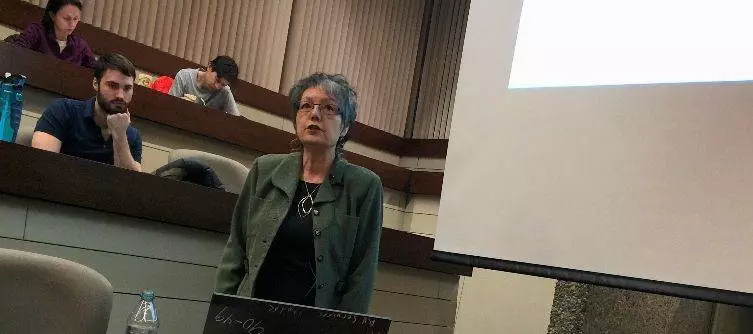
The University of Regina Centre on Aging and Health hosted the 12th annual Distinguished Lecture on January 21, 2015. Dr. Neena Chappell, Canada Research Chair in Social Gerontology, University of Victoria discussed how social integration relates to empowerment, civil engagement, social justice, and social determinants of health. Consistent with previous years, the Distinguished Lecture was very well attended, with over one hundred people on hand to listen to Chappell give her talk: “Integration of Older Adults in Society: Is It Really Beneficial?”
Dr. Chappell explained how while social integration has been shown to be beneficial in research studies in that it can result in better mental health, mobility and balance, physical health, and life expectancy. However, the results can be misleading if not examined on more of a case-by-case basis. For example, factors like marital status are not useful without contextual information, as being in a bad marriage is usually not helpful for health. Nonetheless, many older adults are integrated socially, through either clubs and organizations or informal activities such as meeting new friends, having conversations, going for coffee, or taking walks all of which can be beneficial for health.
Lack of social integration could contribute to memory or other cognitive decline, cardiovascular disease, and other health conditions. Dr. Chappell explained that the research shows that social integration can help with these issues; however, which types of social integration and how much time needs to be dedicated to them remains unclear. Dr. Chappell stated that some society level interventions are effective in bettering the lives of older adults. These include provision of free or low-cost bus fare, civic engagement in adult day health centres, establishment of seniors’ centers, music therapy, and encouraging older adults volunteer (e.g., in schools). Dr. Chappell also said that poverty could be a social determinant of health and could limit access to opportunities for social involvement. Increasing social involvement in a large scale will require support from several levels of government and increased recognition that social support is a key social determinant of health.
Dr. Chappell said that there is more than enough evidence to show that social integration is beneficial for the health and well-being of older adults. In fact, declining health often leads to isolation, so people need to maintain valuable relationships (and create new ones) throughout life. However, social integration needs to be tailored to particular older adults and cannot be forced onto an individual. Ultimately, regardless of the social interaction, older adults should be involved in ways where they feel necessary, recognize that they are a part of a decision-making process, and that they have an impact on those around them and on their society. Therefore, small-scale individual involvement is helpful, but broader social change is required to tackle fundamental causes of inequity and social injustice.
For the presentation slides, contact cah@uregina.ca
Congratulations to #URegina's @DrThomasHadjist, newly elected as a Fellow of the @src_rsc. His groundbreaking work is improving care for older adults with #dementia and chronic pain worldwide.
📺 Watch the video below, and learn more in Discourse: 📖 https://bit.ly/3WWYQbC
Two #URegina researchers have been elected Fellows of the @src_rsc — the country’s highest academic honour. 👏
Congrats to Dr. @rncarleton and @DrThomasHadjist, whose research is improving lives across Canada and beyond.
Learn more in Discourse:

Two U of R academics honoured | Discourse Magazine
Two University of Regina researchers elected Fellows of the Royal Society of Canada
bit.ly
📅 Mark your calendars! Join us on Dec 10 for a webinar that explores how building design & operation can protect older adults’ health against extreme heat and wildfire smoke events.
🔗 Don’t miss out—register today: https://shorturl.at/IQwQg
Deeply honoured to join the Royal Society of Canada. I am grateful to an extraordinary team of collaborators and trainees who have helped advance our research on pain in dementia. Proud of what we’ve built, and motivated for what’s next.
This National Pain Awareness Week, people are still needlessly experiencing unmanaged pain. Find out what can be done to address it and look at how far we've come in the implementation of the Action Plan for Pain in Canada. #NPAW2025 http://PainCanada.ca/actionplan
Congratulations to #URegina psychology professor @DrThomasHadjist, recipient of the 2025 @cagacg Contribution to Gerontology Award!
Presented on Saturday in Montreal, the award honours outstanding contributions to the field of aging. 👏 #gerontology #research #congrats